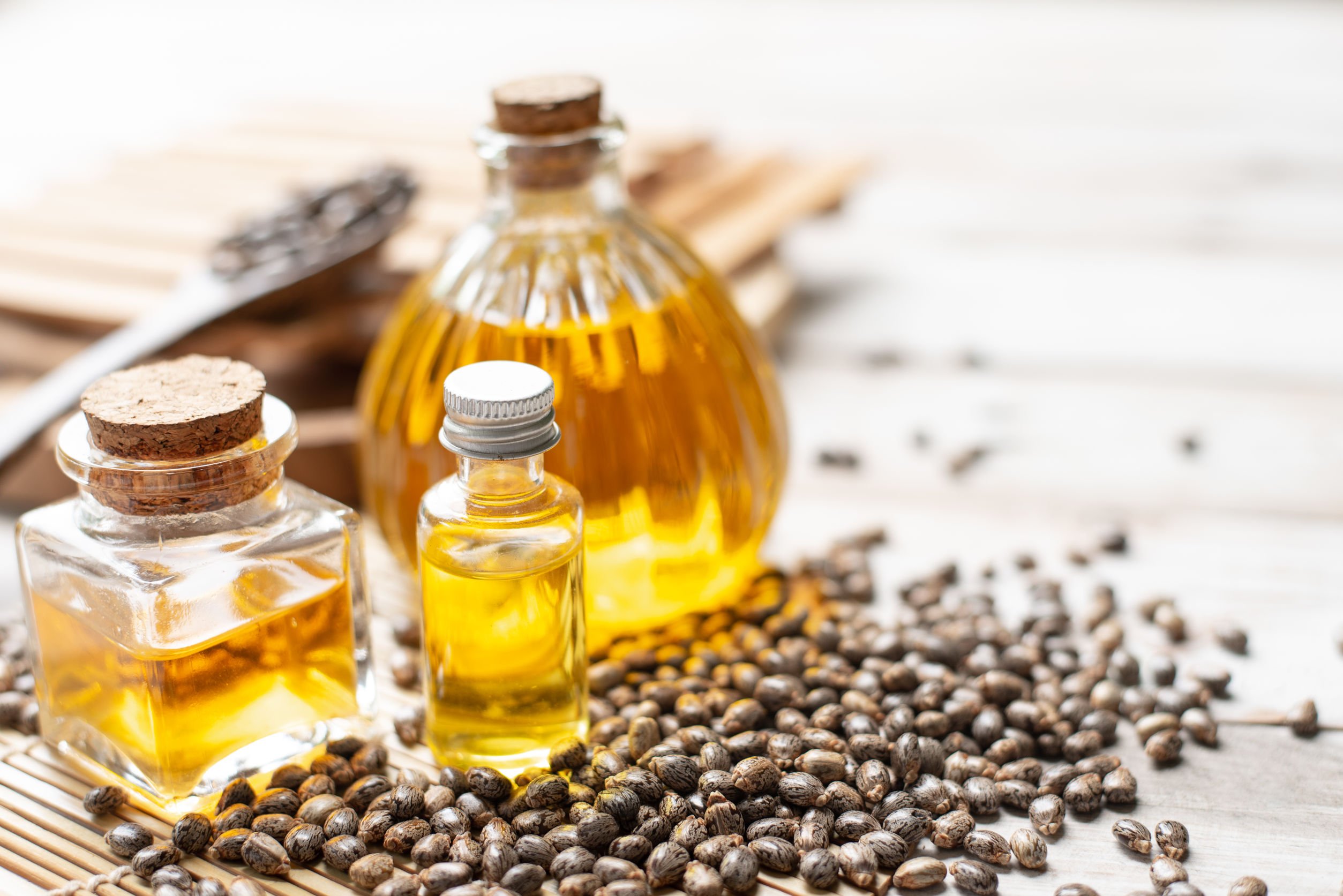The use of Castor oil could be traced back all the way to the early Egyptians, who used it as an ointment. Now, this oil is popular as a hair care product, said to improve hair growth and look. Keep reading to explore all the potential health benefits of Castor oil and the science that backs it up.
What Is Castor Oil?
Castor oil is a pale yellowish vegetable oil derived from the castor bean plant — Ricinus communis. The bean of the plant is most frequently used as a standard remedy, although other parts are believed to possess biological consequences too.
Castor bean oil has been used by the ancient Egyptians as an ointment for wounds, also from the Greeks and Romans as a laxative. In South India, both castor oil and coconut oil are thought to nourish skin and promote hair growth.

One important thing to notice is that castor plant seeds contain a compound called ricin, which is very poisonous. Ingestion of the entire seed is dangerous, although short-term oral ingestion of castor oil is deemed probably secure.
In this article, we’ll concentrate on castor oil as a topical product, which is commonly used on the skin and hair. There is some evidence that topical castor oil can promote hair appearance and assist with wound healing, but clinical research is constrained.
Snapshot
Proponents
- May enhance hair growth and look
- Might help with wound healing
Skeptics
- Clinical investigation is lacking
- May cause baldness
- Can Lead to skin reactions
Components of Castor Oil
Castor Petroleum includes a unique compound known as ricinoleic acid, which makes up 90% of the fat from the oil. Ricinoleic acid is an unsaturated fatty acid that may be responsible for some of the castor oil’s biological consequences.
Small quantities of other fatty acids can also be found inside, such as linoleic and oleic acid. Research also suggests that the oil content in Castor oil varies, depending on environmental factors and plant types used to manufacture it.
Castor Oil is usually very thick and hard to wash out if used by itself. For this reason, commercially accessible castor oil goods are sometimes blended with other milder oils, such as coconut oil.
The oil extraction procedure generally removes all the ricin from castor oil.
Jamaican Black Castor Oil vs. Regular Castor Oil
Jamaican Black castor oil is a type of castor oil that is also commercially available. It includes ash, which can be a byproduct of this bean roasting procedure. According to manufacturers, the ash makes the oil less sticky and easier to apply.
The safety and efficacy of Jamaican Black castor oil are unclear as no clinical trials have analyzed this type of Castor oil.
How Can Castor Oil Improve Hair and Skin Health?
There Is some evidence that ricinoleic acid (one of the chief compounds inside Castor oil) may inhibit an enzyme known as prostaglandin D2. Elevated levels of this enzyme might be connected to slower hair growth, baldness, and oily skin.
Animal research also indicates that castor oil might have anti-inflammatory and antioxidant effects.
Potential Benefits for Skin & Hair
Insufficient Proof For
The Following purported advantages of Castor oil are just supported by restricted, low-quality clinical trials. There is insufficient evidence to support using Castor oil for any of the applications listed below. Don’t forget to speak with a health care provider prior to taking castor oil. It should not be utilized as a replacement for approved medical treatments.
Hair Care & Moisturization
Castor Oil is popular as a hair conditioner. It’s thought to promote hair growth, improve texture and reduce dandruff. But, very little research exists to support these claims.
One image analysis looked At the effect of various cosmetic products on hair samples. The researchers discovered that topical castor oil might increase hair luster. It is unknown if castor oil offers additional advantages to hair.
Wound Healing
Castor oil has been used as a traditional treatment for wounds.
A Retrospective study of 36 patients with skin graft wounds appeared at the ramifications of a combination ointment containing castor oil, balsam of Peru, and trypsin. According to the researchers, this ointment can improve recovery.
Another Analysis of 861 patients using exactly the same ointment cited above found that this combination ointment may shorten healing time in stress ulcers, a sort of skin wound brought on by prolonged stress or friction.
Research Has also analyzed castor oil’s impact on melasma, a skin condition that leads to dark patches to appear on the face. In a study of 30 patients with melasma, a skin peel containing castor oil and phenol reduced skin discoloration in all the patients.
Animal And Cell Research (Lacking Evidence)
No Clinical evidence supports the use of castor oil for some of the states listed within this part. Below is a list of the present animal and cell-based research, which should guide additional investigational efforts. On the other hand, the studies listed below should not be interpreted as supportive of any health advantage.
Inflammation
Animal Studies in rats and guinea pigs imply that ricinoleic acid (the primary compound in Castor oil) has anti-inflammatory effects when applied topically.
Antibacterial Properties
A cell analysis found that castor oil can be effective against several types of bacteria.
How Is Castor Oil Used?
Some People are allergic to Castor oil. To avert a harmful reaction, test a small patch of skin or scalp first and wait for at least 24 h to observe how you are going to react.
Castor oil is very thick and maybe Hard to wash out. Generally, only a small amount should be used on the hair and scalp. There have been cases where using an excessive amount of castor oil led to baldness.
Jamaican Black castor oil is supposed to be easier to use and wash out thanks to the ash material, but this is based only on anecdotal advice. It is safer to use it sparingly and cautiously.
Some People Today combine castor oil with less viscous oils, such as:
- Coconut oil
- Olive oil
- Sesame oil
- Avocado oil
- Almond oil
Side Effects & Precautions
This list doesn’t cover all potential side effects. Contact your doctor or pharmacist if you see any other side effects.
Allergic Reactions
Castor Oil may cause an allergic skin reaction known as contact dermatitis. It is not thought to be that a significant skin irritant but may lead to irritation in susceptible individuals.
A Case study looked at the consequences of hairspray that contained Castor oil. During a two-year interval, 12 cases of dermatitis were reported.
A Different study of 202 patients with inflamed lips discovered that ricinoleic acid has been the most common allergen in lipstick. Researchers also discovered that ricinoleic acid can make a rash.
Hair Matting
Users Should be aware that castor oil has a very thick consistency when used alone. In one instance, a girl developed acute hair matting after using oil baths with coconut and Castor oil. Hair matting happens when the hair gets badly twisted and entangled.
User Experiences
The Opinions expressed in this section are only those of Castor oil, who might or might not have medical or scientific training. Their testimonials do not reflect the opinions of us. We do not endorse any specific item, service, or therapy.
Do not consider User encounters as medical information. Never delay or disregard seeking professional medical advice from your doctor or other qualified medical care providers because of something you have read on our website. We understand that reading person, real-life experiences can be a helpful resource, but it is never a substitute for professional medical advice, diagnosis, or treatment from a qualified healthcare provider.
Reviews Of Castor oil are generally positive. Many utilize Castor oil for skin and hair care. Users say their own hair grows faster, shinier, and stronger. Additionally, some users say it noticeably reduces the number of wrinkles and acne.
Negative testimonials frequently mention the strong odor. Multiple users have contrasted the oil’s scent to smokes. Others have complained about its thick consistency and stickiness.
Takeaway
Castor Petroleum is a vegetable oil derived from the Castor bean plant. Since ancient times, it has been used as an ointment and laxative. Nowadays, Castor oil is popular as a decorative product. It is supposed to help Enhance hair growth and health. But, There’s very little clinical research to support those claims.

